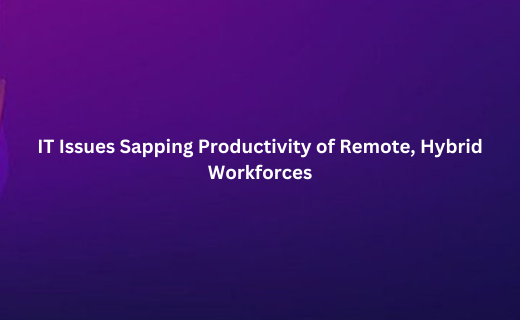-

IT Issues Sapping Productivity of Remote, Hybrid Workforces
Tech issues are sapping the productivity of remote workers, with nearly half (49%) of employees estimating they lose between one and five hours weekly.
These were the findings of a Unisys survey of 2,000 employers and employees across the U.S., United Kingdom, Germany, and Australia, which also revealed that more than four in 10 (42%) employers do not measure productivity loss due to IT issues.
Remote work has put a spotlight on tech issues impacting worker productivity and, as a result, more leaders are looking for the right solution, according to Joel Raper, senior vice president and general manager of digital workplace solutions for Unisys.
"Before the pandemic, many companies did not have a remote work policy, let alone a hybrid one," he said. "Organizations were forced to quickly adjust policies, processes, and technology to accommodate this shift and keep operations as normal as possible."
However, with this quick shift came the need to maintain an efficient IT infrastructure that combats security vulnerabilities and allows employees to work as needed.
"Organizations need to reimagine how they handle issue escalation, device life cycle management, and employee onboarding. It starts with identifying areas for improvement," Raper said. "Engaging employees in this process can boost efficiencies and employee satisfaction."
How the Right Tech Tools Can Motivate Workers to Stay
The report findings indicated two-thirds of employees who became more engaged in the past six months said having the right tech was highly motivating.
"It's a shared responsibility among the workforce — both leaders and workers — to identify challenges and work to solve them," Raper said.
The survey data shows that identifying worker pain points and working collaboratively to address tech issues have a direct impact on a company's productivity, sales, and bottom line.
Aside from salary, employees ranked access to technology tools and support to effectively do their jobs as the most influential factor in deciding whether to stay or leave an employer.
"We need to keep employees top of mind and engage them when making IT updates that will impact the greater hybrid experience," Raper said. "Employers and employees don't always see eye to eye when it comes to which technologies are most important for collaboration and efficiency."
For example, while 67% of employees ranked video conferencing as very important, only 38% of their companies have deployed it.
"Employees want to be productive and efficient, and they know technology can help them achieve this," Raper said. "Dispelling the friction between the two mindsets is critical to improving the overall IT experience for employees."
He advises organizations to start by investing in employee experience programs where employees can voice complaints, share what's working, and identify solutions to help companies remove the disconnect.
Raper said he was initially surprised that the 25-and-under cohort preferred to be in the office more than their older colleagues.
"However, when we took a step back and realized many of them may have never worked in an office full-time due to the shift to remote or hybrid work over the past three years, it made sense they would like to have that experience of in-person collaboration," he said.
This cohort may also be burned out from remote work because many of them are recent graduates of colleges where they were forced to finish their education in virtual classrooms.
Tech Preferences Differ Between Age Groups
"Tech preferences also surprised us. The 25-and-under cohort was less inclined than their peers to find solutions like virtual reality and wearable devices important," Raper said.
That group rated foundational tools such as video conferencing and web-based video collaboration tools as more important than their older colleagues.
"That's not a mindset you would associate with a younger generation known for driving adoption of new technologies," he said.
Raper said it's up to IT professionals to build networks that foster innovation without compromising security and inhibiting collaboration and productivity.
"It's a tall, but not impossible, order," he added. "We must first evaluate existing frameworks to identify what can be improved. Employees can be great partners in this."
Raper noted that 92% of employees surveyed are somewhat to very willing to share their data if it would enable more predictive technology support.
"This data can come from sources ranging from employee experience surveys to software that proactively alerts IT about issues," he said. "Customer-facing employees are more willing to share their data than their non-customer-facing colleagues because they report being more negatively impacted by security policies than their colleagues."
Follow us on LinkedInAbout the Author

Kamal Rastogi is a serial IT entrepreneur with 25 yrs plus experience. Currently his focus area is Data Science business, ERP Consulting, IT Staffing and Experttal.com (Fastest growing US based platform to hire verified / Risk Compliant Expert IT resources from talent rich countries like India, Romania, Philippines etc...directly). His firms service clients like KPMG, Deloitte, EnY, Samsung, Wipro, NCR Corporation etc in India and USA.